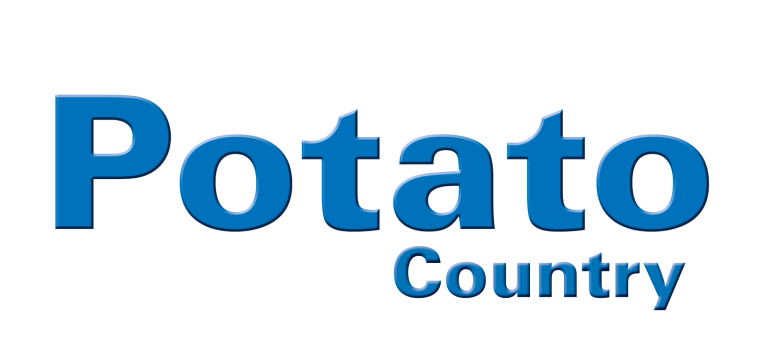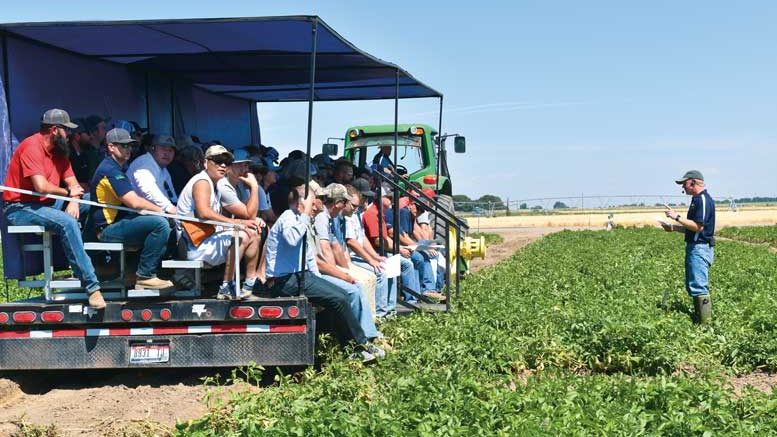Story and photos by Dave Alexander, Publisher

Jeff Miller shares some insight with an attendee at the annual Miller Research Potato Pest Management Field Day.
For Jeff Miller, the Real World is not a “reality” TV show about 20-somethings living in an anything-but-real-life environment. “Real world” to Miller represents what he prides himself on: producing potato test trials grown in real grower conditions. He faces the same conditions, circumstances and situations that commercial potato growers see day in and day out.
The owner-operator of Miller Research in Rupert, Idaho, Miller runs between 50 and 60 field trials a year for a list of crop protection, nutrient and irrigation clients that reads like a who’s-who in the potato industry. These companies use Miller because what works at Miller Research also works for commercial growers.
The Father, The Son
After earning a degree in plant pathology from Utah State University, Jeff’s dad, Terry, came home to grow potatoes in eastern Idaho. Contacts from University of California Berkeley started asking Terry to conduct some field tests on his farm. Terry quickly developed a reputation for running trusted, unbiased tests. He then started doing some trials for the Idaho Potato Commission and soon realized there was a need for a full-time, independent research facility. Terry started Miller Research in 1975. He gave up the commercial growing side of his operation to focus solely on research in 2002.
Growing up, Jeff wanted to eventually take over Miller Research, so he, too, became a plant pathologist. But providence steered him to the University of Minnesota, where he became a faculty member. When a job opened at the University of Idaho, Miller jumped at the chance to move closer to home and his roots. After six years at the University of Idaho Extension in Aberdeen, Idaho, Jeff finally took over the family business in 2007. Though “retired,” Terry still occasionally helps out.

Miller Research Potato Pest Management Field Day provides an opportunity to see a variety of potato diseases.
The Reputation
Jeff has maintained the trusted, unbiased reputation for testing started by his father, but it is also the flexibility and responsiveness his company can provide that keeps customers coming back.
“We have greater control, and I don’t have to publish,” Miller says. “We are easy to work with, and we give customers the tests they asked for with unbiased results.”
Because he is not publishing white papers, his studies don’t take two to three years as they might at a university. Without added red tape, the company can quickly react to client requests. Trial results are delivered in December, and Miller will even feed information to customers throughout the trial.
Because Miller Research is independent, Miller can also provide non-disclosure trials, usually balked at by universities, he says. He has more work than he can handle.
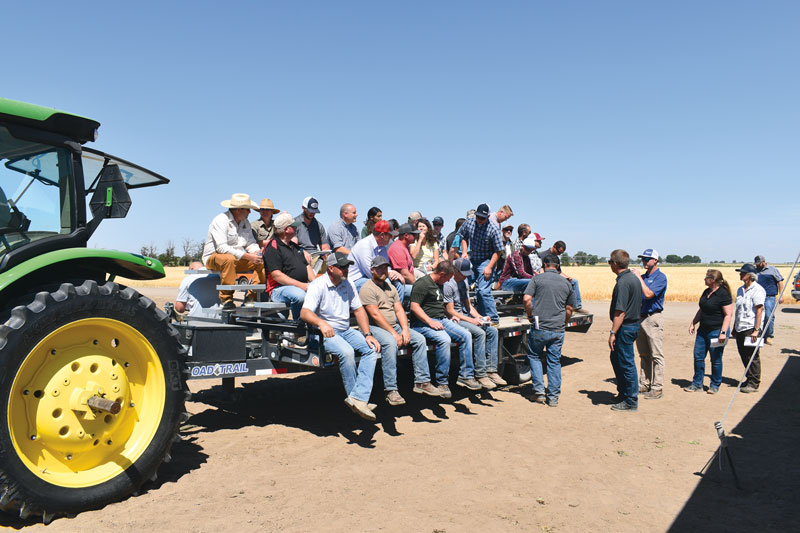
Participants at the Miller Research Potato Pest Management Field Day board a trailer that will take them out into the field. Every year, Miller holds two open houses, one in the summer and one in the winter.
The Layout
While he is appreciative to have so much work, Miller does wish he had more space to do it. The operation is only 45 acres, 35 of which are rented. Potatoes are on a three-year rotation. Miller would like to rotate every four or five years, but like most real-world growers, he simply does not have enough land. The facility also tests sugar beets, small grain, corn, alfalfa and has even grown lima beans for a pesticide registration.
Another difficulty Miller Research shares with real-world growers is a lack of labor. Finding people to do fieldwork is challenging. The small community in which the company is located simply does not have enough part-time labor during harvest. Additionally, workers will opt to work for larger growers in the area because they can provide longer-term employment. Miller was able to hire someone to help with harvest this season, but when the person had an injury, Miller ended up taking his place.
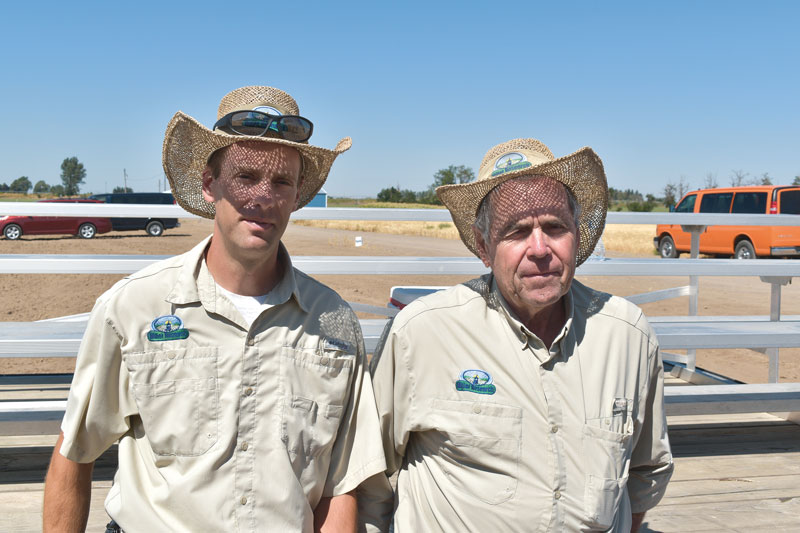
Trent Taysom (left) and Terry Miller with Miller Research answer questions at the company’s field day.
The Tools
Miller Research has developed its own methods and tools in order to ensure reliable testing. Miller has a large machine that simulates a pivot, but can be used on small plots, allowing him to test products applied through fertigation and chemigation.
A self-propelled, V-twin-powered sprayer built on-site has been designed to apply precise rates of product, without overspray. It uses a magnetic mixing tank and air pressure to accurately replicate label stipulations.
These tools and the fact that he doesn’t have to give any attention to selling or marketing potatoes allows Miller to focus on research and really figure out what works and what doesn’t.
“Growers are smart or they wouldn’t be growing potatoes,” Miller says.
He cautions growers, however, to be skeptical. Some products are good, but others have not been tested thoroughly enough. Other products may work on their own, but not well when used in combination with what growers are already using. Miller also reminds growers who do their own testing to make sure their results haven’t been skewed by other factors they may not have even considered.
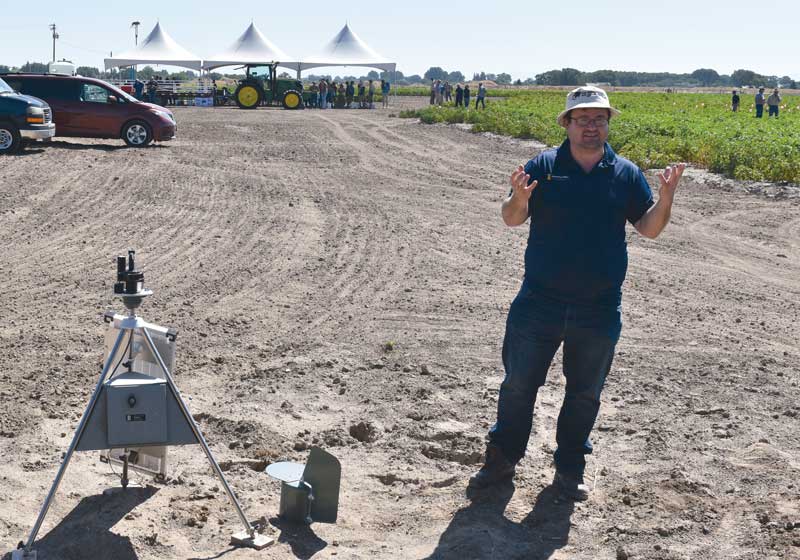
James Woodhall with the University of Idaho explains the university’s spore trapping program to attendees at the Miller Research Potato Pest Management Field Day.
The Presentations
Every year, Miller Research hosts a summer field day for about 120 attendees. Then, in January or February, Miller again invites the potato industry to his facility to hear the results of those summer trials. Miller shares yield data and outcomes of his potato plots and best management practices for a variety of diseases plus real-world results and recommendations for real-world growers.
